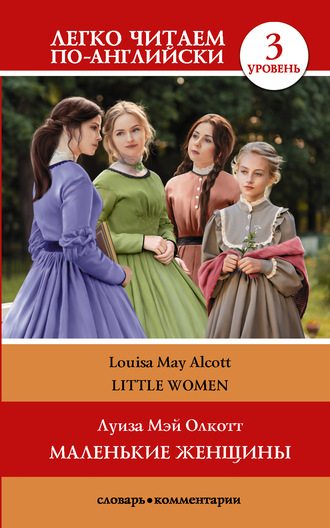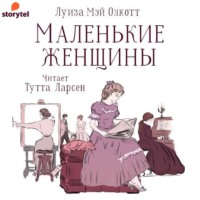
Полная версия
Маленькие женщины / Little Women. Уровень 3
Jo happened to suit Aunt March, who was lame and needed an active person to wait upon her. Jo accepted the place since nothing better appeared and, to every one's surprise, got on remarkably well with her relative. There was an occasional tempest, and once Jo marched home, declaring she couldn't bear it longer, but Aunt March always cleared up quickly, and she could not refuse, for in her heart she rather liked the peppery old lady.
Part of the real attraction was a large library of fine books, which was left to dust and spiders since Uncle March died. The moment Aunt March took her nap, or was busy with company, Jo hurried to this quiet place, and devoured poetry, romance, history, travels, and pictures like a regular bookworm.
Jo's ambition was to do something very splendid. What it was, she had no idea as yet. A quick temper, sharp tongue, and restless spirit were always getting her into scrapes, and her life was a series of ups and downs. But the training she received at Aunt March's was just what she needed.
Beth was too bashful to go to school. It had been tried, but she suffered so much that it was given up, and she did her lessons at home with her father. Even when he went away, Beth went faithfully on by herself. She had six dolls she dressed every morning, for Beth was a child still and loved her pets as well as ever.
Beth often ‘wept a little weep' as Jo said, because she couldn't take music lessons and have a fine piano. She loved music so dearly, tried so hard to learn, but the keys wouldn't keep in tune.
If anybody had asked Amy what the greatest trial of her life was, she would have answered at once, “My nose.” When she was a baby, Jo had accidently dropped her into the coal hod, and Amy insisted that the fall had ruined her nose forever. It was rather flat, and all the pinching in the world could not give it an aristocratic point.
“Little Raphael,” as her sisters called her, had a decided talent for drawing, and was never so happy as when copying flowers, designing fairies, or illustrating stories.
Meg was Amy's confidant, and by some strange attraction of opposites Jo was Beth's. The two older girls were a great deal to one another, but each took one of the younger sisters into her keeping and watched over her in her own way.
“Has anybody got anything to tell? It's been such a terrible day,” said Meg, as they sat sewing together that evening.
“I had a queer time with Aunt today, and, as I got the best of it, I'll tell you about it,” began Jo, who dearly loved to tell stories. “When she started to nod off, I whipped the Vicar of Wakefield out of my pocket, and read away, with one eye on him and one on Aunt. I'd just got to where they all tumbled into the water when I forgot and laughed out loud. Aunt woke up and, told me to read a bit and show what frivolous work I preferred to Belsham. I did my very best and she told me to finish the chapter.”
“Did she like it?” asked Meg.
“Oh, bless you, no! But she let old Belsham rest,” added Jo.
“That reminds me,” said Meg, “that I've got something to tell. It isn't funny, like Jo's story. At the Kings' today one of the children said that her oldest brother had done something dreadful, and Papa had sent him away. I heard Mrs. King crying and Mr. King talking very loud. I felt so sorry for them and was rather glad I hadn't any wild brothers to do wicked things and disgrace the family.”
“I think being disgraced in school is worse than anything bad boys can do,” said Amy, shaking her head. “Susie Perkins drew a picture of Mr. Davis today, with a monstrous nose and a hump, and the words, ‘Young ladies, my eye is upon you!' coming out of his mouth in a balloon thing. We were laughing over it when all of a sudden he saw us, and ordered Susie to bring up her slate. She was parrylized with fright, but she went, and oh, what do you think he did? He took her by the ear – the ear!”
“Tell another story, Mother, one with a moral to it. I like to think about them afterward,” said Jo, after a minute's silence.
Mrs. March smiled and began at once.
“Once upon a time, there were four girls, who had enough to eat and drink and wear, a good many comforts and pleasures, kind friends and parents who loved them dearly, and yet they were not contented. These girls were anxious to be good and made many excellent resolutions, but they did not keep them very well, and were constantly saying, ‘If only we had this,' or ‘If we could only do that,' forgetting how much they already had. So they asked an old woman what they could do to make them happy, and she said, ‘When you feel discontented, think over your blessings, and be grateful.'” Being sensible girls, they decided to try her advice. One discovered that money couldn't keep shame and sorrow out of rich people's houses, another that, though she was poor, she was a great deal happier, with her youth, health, than a certain feeble old lady, a third that nothing was as valuable as good behavior. So they agreed to stop complaining, to enjoy the blessings they already had.”
“Now, Marmee, that is very good of you to turn our own stories against us, and give us a sermon instead of a romance!” cried Meg.
“I like that kind of sermon. It's the sort Father used to tell us,” said Beth thoughtfully.
“We needed that lesson, and we won't forget it!'” added Jo, who could not, for the life of her, help getting a morsel of fun out of the little sermon.
Chapter five
Being neighborly
“What are you going to do now, Jo?” asked Meg one snowy afternoon, as her sister came through the house, in rubber boots, old sack, and hood, with a broom in one hand and a shovel in the other.
“Going out for exercise,” answered Jo. “I like adventures, and I'm going to find some.”
Jo went outside and began to dig paths with great energy. The snow was light, and with her broom she soon swept a path all round the garden. Now, the garden separated the Marches' house from that of Mr. Laurence. A low hedge parted the two estates. On one side was an old, brown house, looking rather bare and shabby, robbed of the vines that in summer covered its walls and the flowers, which then surrounded it. On the other side was a stately stone mansion. It seemed a lonely, lifeless sort of house. Few people went in and out, except the old gentleman and his grandson.
To Jo's lively fancy, this fine house seemed a kind of enchanted palace. She wanted to know more about it, and to know the Laurence boy.
“That boy is suffering for society and fun,” she said to herself. “His grandpa does not know what's good for him, and keeps him shut up all alone. I've a great mind to go over and tell the old gentleman so!”
The idea amused Jo, who liked to do daring things and was always scandalizing Meg by her queer performances. And when the snowy afternoon came, Jo resolved to try what could be done. She saw Mr. Lawrence drive off, and then went to dig her way down to the hedge, where she paused and took a survey. All quiet, curtains down at the lower windows, servants out of sight, and nothing human visible but a curly black head leaning on a thin hand at the upper window.
“There he is,” thought Jo, “Poor boy! All alone. It's a shame! I'll toss up a snowball and make him look out, and then say a kind word to him.”
Up went a handful of soft snow, and the head turned at once, showing a face which lost its listless look in a minute, as the big eyes brightened and the mouth began to smile. Jo nodded and laughed, and flourished her broom as she called out…
“How do you do? Are you sick?”
Laurie opened the window, and croaked out as hoarsely as a raven…
“Better, thank you. I've had a bad cold, and been shut up a week.”
“I'm sorry. What do you amuse yourself with?”
“Nothing.”
“Don't you read?”
“Not much. They won't let me.”
“Have someone come and see you then.”
“There isn't anyone I'd like to see. Boys are loud, and my head hurts.”
“Isn't there some nice girl who'd read and amuse you? Girls are quiet.”
“Don't know any.”
“You know us,” began Jo, then laughed and stopped.
“So I do! Will you come, please?” cried Laurie.
“I'm not quiet and nice, but I'll come, if Mother will let me. I'll go ask her. Shut the window, like a good boy, and wait till I come.”
With that, Jo marched into the house.
Laurie was in a flutter of excitement at the idea of having company, and flew about to get ready. Presently there came a loud ring, then a decided voice, asking for ‘Mr. Laurie', and a surprised-looking servant came running up to announce a young lady.
“All right, let her in, it's Miss Jo,” said Laurie. Jo appeared, looking rosy. Laurie watched her in respectful silence, and when she beckoned him to his sofa, he sat down with a sigh of satisfaction, saying gratefully…
“How kind you are! Yes, that's what it wanted. Now please take the big chair and let me do something to amuse my company.”
“No, I came to amuse you. Shall I read aloud?” said Jo, looking at the books in the room.
“Thank you! I've read all those, and if you don't mind, I'd rather talk,” answered Laurie.
“Not a bit. I'll talk all day. Beth says I never know when to stop.”
“Is Beth the rosy one, who stays at home?” asked Laurie with interest.
“Yes, that's Beth.”
“The pretty one is Meg, and the curly-haired one is Amy, I believe?”
“How did you find that out?”
Laurie colored up[13], but answered frankly, “Why, you see I often hear you calling to one another, and when I'm alone up here, I can't help looking over at your house, you always seem to be having such good times.”
And Laurie poked the fire to hide a little twitching of the lips that he could not control.
“I wish that instead of peeping, you'd come over and see us. Wouldn't your grandpa let you?”
“I think he would, if your mother asked him,” said Laurie, brightening more and more.
“We are not strangers, we are neighbors, and you won't be a bother. We know all of our neighbors but you.”
Then they got to talking about books, and to Jo's delight, she found that Laurie loved them as well as she did, and had read even more than herself.
“If you like them so much, come down and see ours. Grandfather is out, so you needn't be afraid,” said Laurie, getting up.
“I'm not afraid of anything,” returned Jo.
They came to the library, where she clapped her hands and pranced, as she always did when especially delighted. It was lined with books, and there were pictures and statues, and cabinets, and bronzes, and best of all, a great open fireplace.
“What richness!” sighed Jo, sinking into the depth of a velour chair. “Theodore Laurence, you ought to be the happiest boy in the world,” she added impressively.
“A fellow can't live on books,” said Laurie, shaking his head as he perched on a table opposite.
Before he could more, a bell rang, and Jo jumped up, “It's your grandpa!”
“Well, what if it is? You are not afraid of anything, you know,” returned the boy.
“I think I am a little bit afraid of him, but I don't know why I should be. Marmee said I might come, and I don't think you're any the worse for it,” said Jo, composing herself, though she kept her eyes on the door.
“I'm a great deal better for it. I'm only afraid you are very tired of talking to me. It was so pleasant, I couldn't bear to stop,” said Laurie gratefully.
“The doctor to see you, sir,” and the maid beckoned as she spoke.
“Would you mind if I left you for a minute? I suppose I must see him,” said Laurie.
“Don't mind me. I'm happy as a cricket here,” answered Jo.
Laurie went away, and his guest amused herself in her own way. She was standing before a fine portrait of the old gentleman when the door opened again, and without turning, she said decidedly, “I'm sure now that I shouldn't be afraid of him, for he's got kind eyes, though his mouth is grim, and he looks as if he had a tremendous will of his own. He isn't as handsome as my grandfather, but I like him.”
“Thank you, ma'am,” said a gruff voice behind her, and there, to her great dismay, stood old Mr. Laurence.
Poor Jo blushed till she couldn't blush any redder. A second look showed her that the living eyes, under the bushy eyebrows, were kinder even than the painted ones. The old gentleman said, after the dreadful pause, “So you're not afraid of me, hey?”
“Not much, sir.”
“And you don't think me as handsome as your grandfather?”
“Not quite, sir.”
“And I've got a tremendous will, have I?”
“I only said I thought so.”
“But you like me in spite of it?”
“Yes, I do, sir.”
“You've got your grandfather's spirit, if you haven't his face. He was a fine man, my dear, but what is better, he was a brave and an honest one, and I was proud to be his friend.”
“Thank you, sir,” And Jo was quite comfortable after that.
“What have you been doing to this boy of mine, hey?” was the next question, sharply put.
“Only trying to be neighborly, sir.” And Jo told how her visit came about.
“You think he needs cheering up a bit, do you?”
“Yes, sir, he seems a little lonely, and young folks would do him good perhaps. We are only girls, but we should be glad to help if we could, for we don't forget the splendid Christmas present you sent us,” said Jo eagerly.
“Tut, tut, tut! That was the boy's affair. How is the poor woman?”
“Doing nicely, sir.”
“I shall come and see your mother some fine day. There's the tea bell. Come down and go on being neighborly.”
“If you'd like to have me, sir.”
“Shouldn't ask you, if I didn't.” And Mr. Laurence offered her his arm with old-fashioned courtesy.
“What would Meg say to this?” thought Jo, as she was marched away, while her eyes danced with fun as she imagined herself telling the story at home.
“Hey! Why, what the dickens has come to the fellow[14]?” said the old gentleman, as Laurie came running downstairs and stopped at the sight of Jo arm in arm with his grandfather.
“I didn't know you'd come, sir,” he began, as Jo gave him a triumphant little glance.
“That's evident, by the way you ran downstairs. Come to your tea, sir, and behave like a gentleman.”
“She's right, the lad is lonely. I'll see what these little girls can do for him,” thought Mr. Laurence, as he looked and listened. He liked Jo.
They found Mr. Laurence standing before the fire in the great drawing room, but Jo's attention was entirely absorbed by a grand piano, which stood open.
“Do you play?” she asked, turning to Laurie with a respectful expression.
“Sometimes,” he answered modestly.
“Please do now. I want to hear it, so I can tell Beth.”
“Won't you first?”
“Don't know how. Too stupid to learn, but I love music dearly.”
So Laurie played and Jo listened. He played remarkably well and she wished Beth could hear him.
“That will do, that will do, young lady. Too many sugarplums are not good for him. His music isn't bad, but I hope he will do as well in more important things. I hope you'll come again. My respects to your mother. Good night, Doctor Jo.”
He shook hands kindly, but looked as if something did not please him. When they got into the hall, Jo asked Laurie if she had said something wrong. He shook his head.
“No, it was me. He doesn't like to hear me play.”
“Why not?”
“I'll tell you some day.”
“Take care of yourself, won't you?”
“Yes, but you will come again, I hope?”
“If you promise to come and see us after you are well.”
“I will.”
“Good night, Laurie!”
“Good night, Jo, good night!”
Chapter six
Beth finds the palace beautiful
The big house seemed like a palace, and Beth found it very hard to pass the lions[15]. Old Mr. Laurence was the biggest one, but after he had called, said something funny or kind to each one of the girls, nobody was afraid of him, except Beth.
Though yearning for the grand piano, Beth could not pluck up courage to go to the ‘Mansion of Bliss', as Meg called it. She went once with Jo, but the old gentleman, not being aware of her infirmity, stared at her so hard from under his heavy eyebrows, and said “Hey!” so loud, that he frightened her. She ran away, declaring she would never go there any more, not even for the piano. No persuasions or enticements could overcome her fear, until, this became knows to Mr. Laurence. He then set about[16] mending matters.
During one of the brief visits he made, he slowly led the conversation to music, and talked away about great singers whom he had seen, fine organs he had heard, and told such charming anecdotes that Beth found it impossible to stay in her corner. As if the idea had just occurred to him, he said to Mrs. March…
“Wouldn't some of your girls like to run over, and practice on a piano now and then, just to keep it in tune, you know, ma'am?”
Beth took a step forward, and pressed her hands tightly together to keep from clapping them. Before Mrs. March could reply, Mr. Laurence went on with an odd little nod and smile…
“They needn't see or speak to anyone, but run in at any time.”
He rose. “Please, tell the young ladies what I say, and if they don't care to come, why, never mind.”
Beth looked up at him with a face full of gratitude, “Oh sir, they do care, very very much!”
“Are you the musical girl?” he asked.
“I'm Beth. I love it dearly, and I'll come, if you are quite sure nobody will hear me, and be disturbed,” she added, fearing to be rude.
“Not a soul, my dear. The house is empty half the day, so come and play as much as you like.”
“How kind you are, sir!”
Beth blushed like a rose and gave the hand a grateful squeeze because she had no words to thank him for the precious gift he had given her. The old gentleman softly stroked the hair off her forehead.
“I had a little girl once, with eyes like these. God bless you, my dear! Good day, madam.”
And away he went, in a great hurry.
Next day, Beth made her way to the drawing room where the piano stood. Quite by accident, of course, some pretty, easy music lay on the piano. With trembling fingers, Beth at last touched the great instrument, and straightway forgot her fear, herself, and everything else but the music.
After that, she went to play nearly every day. She never knew that Mr. Laurence opened his study door to hear the old-fashioned airs he liked. She never saw Laurie guard the hall to warn the servants away. She never suspected that the exercise books and new songs which she found in the rack were put there for her. So she enjoyed herself heartily.
One day, the girls called to Beth.
“Here's a letter from the old gentleman! Come quick, and read it!”
Beth hurried to them. Her sisters took her to the parlor, all pointing and all saying at once, “Look there! Look there!” Beth did look, and turned pale with delight and surprise. There stood a little cabinet piano. A letter was lying on the lid.
“For me?” gasped Beth.
“Yes, all for you, my precious! Isn't it splendid of him? Don't you think he's the dearest old man in the world? We didn't open the letter, but we are dying to know what he says,” cried Jo.
“You read it! I can't! Oh, it is too lovely!” and Beth hid her face in Jo's apron, quite upset by her present.
Jo opened the paper and began to laugh, for the first words she saw were…
“Miss March: “Dear Madam – “
“How nice it sounds! I wish someone would write to me so!” said Amy, who thought the old-fashioned address very elegant.
“‘I thank you for the slippers you gave me,'” continues Jo. “I like to pay my debts, so I know you will allow ‘the old gentleman' to send you something which once belonged to the little grand daughter he lost. With hearty thanks and best wishes, your grateful friend and humble servant, ‘JAMES LAURENCE'.”
“Try it, honey. Let's hear the sound of it,” said Hannah, who always took a share in the family joys and sorrows.
So Beth tried it, and everyone pronounced it the most remarkable piano ever heard.
Chapter seven
Amy's valley of humiliation
Amy was rather late at school, but could not resist the temptation of displaying a brown-paper parcel. During the next few minutes the rumor that Amy March had got twenty-four delicious limes and was going to treat circulated through her friends and became quite overwhelming. Katy Brown invited her to her next party on the spot. Mary Kingsley insisted on lending her watch till recess, and Jenny Snow promptly buried the hatchet[17] and offered to furnish answers to some sums. But Amy instantly crushed ‘that Snow girl's’ hopes by the withering telegram, “You needn't be so polite all of a sudden, for you won't get any.”
Alas, alas! The revengeful Snow turned the tables[18] with disastrous success. During the lesson, under pretense of asking an important question, she informed Mr. Davis, the teacher, that Amy March had pickled limes in her desk. Now Mr. Davis had declared limes a contraband article.
Soon as he heard the word ‘limes', his face flushed.
“Young ladies, attention, if you please!”
Fifty pairs of blue, black, gray, and brown eyes were fixed upon him.
“Miss March, come to the desk.”
Amy rose, but the limes weighed upon her conscience.
“Bring with you the limes you have in your desk.”
Amy laid themt down before Mr. Davis.
“Is that all?”
“Yes, sir.”
“Now take these disgusting things two by two, and throw them out of the window.”
Scarlet with shame and anger, Amy went to and fro six dreadful times. As Amy returned from her last trip, Mr. Davis gave a portentous “Hem!” and said, in his most impressive manner…
“Young ladies, you remember what I said to you a week ago. I am sorry this has happened, but I never allow my rules to be broken, and I never break my word. Miss March, hold out your hand.”
Amy started, and put both hands behind her.
“Your hand, Miss March!”
Amy threw back her head defiantly, stretched out her hand and bore without flinching several blows on her little palm. They were neither many nor heavy, but that made no difference to her. For the first time in her life she had been struck, and the disgrace, in her eyes, was as deep as if he had knocked her down.
“You will now stand on the platform till recess,” said Mr. Davis.
That was dreadful. Taking her place, she fixed her eyes on the stove funnel above what now seemed a sea of faces, and stood there, motionless. During the fifteen minutes that followed, the proud and sensitive little girl suffered a shame and pain which she never forgot.
The fifteen minutes seemed an hour, but they came to an end at last.
“You can go, Miss March,” said Mr. Davis, looking, as he felt, uncomfortable.
He did not soon forget the reproachful glance Amy gave him, as she went, without a word to anyone, snatched her things, and left the place “forever,” as she passionately declared to herself. She was in a sad state when she got home, and when the older girls arrived, some time later, an indignation meeting was held at once. Mrs. March did not say much but looked disturbed, and comforted her daughter.
“Yes, you can have a vacation from school, but I want you to study a little every day with Beth,” said Mrs. March that evening. “I dislike Mr. Davis's manner of teaching and don't think the girls you associate with are doing you any good, so I shall ask your father's advice before I send you anywhere else.”
Chapter eight
Jo meets Apollyon
“Girls, where are you going?” asked Amy, coming into their room one Saturday afternoon, and finding them getting ready to go out with an air of secrecy which excited her curiosity.
“Never mind. Little girls shouldn't ask questions,” returned Jo sharply.
“You are going somewhere with Laurie, I know you are. You were whispering and laughing together on the sofa last night, and you stopped when I came in. Aren't you going with him?”
“Yes, we are. Now do be still, and stop bothering.”
Amy held her tongue, but used her eyes, and saw Meg slip a fan into her pocket.
“I know! I know! You're going to the theater to see the Seven Castles!” she cried, adding resolutely, “and I shall go, for Mother said I might see it, and I've got my rag money, and it was mean not to tell me in time.”














